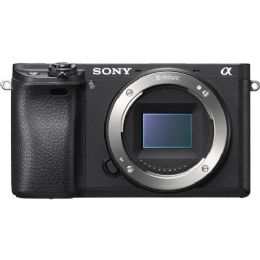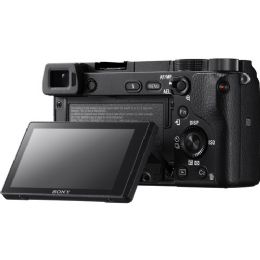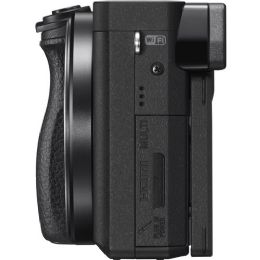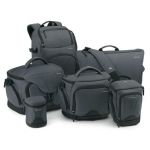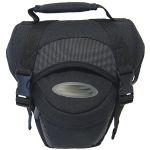Fast-focusing and 4K-shooting, the Alpha a6300 from Sony is a versatile APS-C-format mirrorless digital camera designed for multimedia image-makers. Revolving around a redeveloped 24.2MP Exmor CMOS sensor and BIONZ X image processor, clean image quality is provided with a wide expandable sensitivity range to ISO 51200, along with accelerated readout speeds for internal 4K30 and Full HD 1080p120 video recording with full pixel readout. Stills shooters also benefit from the apt processing speed, which enables continuous shooting at 11 fps for up to 21 raw frames in a burst, as well as 14-bit raw file output. Complementing both stills and video, the sensor and processor combination also avails 4D FOCUS, which combines a wide-coverage 425-point phase-detection system with a 169-area contrast detection system for quick and precise focusing performance. This focusing system also enables High-density Tracking AF for more efficient and accurate tracking of moving subjects across the image frame. A well-rounded camera for both photographers and videographers, the a6300 is characterized by its speed and further qualified by its refined image and video quality.
Complementing the imaging assets, the a6300 also sports a robust magnesium alloy body that is dust- and moisture-resistant to permit working in harsh environments. The compact profile incorporates a high-resolution XGA Tru-Finder 2.36m-dot OLED electronic viewfinder for bright, clear, eye-level viewing, and this EVF features a 120 fps viewing mode for smooth tracking of fast-moving subjects. A rear 3.0" 921.6k-dot LCD monitor is also available and has a tilting design to benefit shooting from high and low working angles. Additionally, for wireless remote control over the camera, or for just sharing imagery online, built-in Wi-Fi with NFC permits linking with a mobile device for intuitive wireless control.
24.2MP Exmor CMOS Sensor and BIONZ X Processor
The APS-C-format 24.2MP Exmor CMOS sensor pairs with the BIONZ X image processor to realize smooth, nuanced image quality with minimal noise and high sensitivity from ISO 100-25600, which can further be expanded to ISO 51200 for working in low-light conditions. The sensor features a unique design that utilizes thin copper wiring and enhanced circuit processing to boost light-gathering abilities, reduce noise, and increase readout speeds to benefit video recording. The sensor and processor combination also avails a top continuous shooting rate of 11 fps for up to 21 raw frames in a single burst with AF and AE, 8 fps shooting in live view, and permits 14-bit raw file output for a wider tonal and color scale.
4D FOCUS
Covering nearly the entire sensor area, a powerful 4D FOCUS system incorporates 425 on-chip phase-detection points along with 169 contrast-detection areas for precise focusing in as little as 0.05 seconds. The density of focusing points from this hybrid AF system also enables High-density Tracking AF Technology, which is adept at tracking moving subjects in a variety of lighting conditions. The use of phase-detection points also enables the use of A-mount lenses via the optional LA-EA3 or LA-EA1 lens mount adapters with full AF compatibility.
The apt 4D FOCUS system also lends itself to a variety of focusing functions for refined accuracy, including Lock-on AF, which maintains focus on moving subjects throughout the use of a configurable frame that is set over the desired moving subject, and Expand Flexible Spot, which employs neighboring focus points to retain focus on moving subjects even if the originally selected point loses focus. Additionally, Eye AF can be used to base focus on recognized subjects' eyes for portraits and is available in both AF-S and AF-C modes. Autofocus can also be used in conjunction with the Focus Magnifier function for critical focus when homing in on minute subject details.
In addition to autofocus, the a6300 also features a Peaking MF function to benefit manual focus control by highlighted sharp edges of contrast for a more objective means of acquiring sharp focus.
UHD 4K Video Recording
Internal recording of UHD 4K movies is possible in multiple frame rates up to 30 fps and, based on the Super35mm recording area and effective 20MP (6000 x 3376) resolution, 2.4x oversampling renders greater detail and full pixel readout is possible, that is void of pixel binning, for higher quality imagery with reduced moiré and aliasing. Full HD 1080p recording is also supported in frame rates up to 120 fps, and both resolutions utilize the 100 Mbps XAVC S format contained within an MP4 wrapper with 4:2:0 sampling. The high-speed, 120 fps recording also enables 4x and 5x slow-motion movie recording with the frame rate set to either 30p or 24p. In addition to high-resolution internal recording, uncompressed HDMI output also enables the use of an optional external recorder for clean 4K recording with 4:2:2 sampling.
Custom Color Profiles and S-Log3 Gamma
Support is available for the S-Gamut3.Cine/S-Log-3 and S-Gamut3/S-Log3 profiles that enable up to a 1300% wider dynamic range for smoother tonal and color gradations, along with enhanced sensitivity and clarity in shadows and mid-tones. These profiles also lend themselves to greater compatibility within a professional workflow and are well-paired to the Cineon Log gamma curve for versatile post-production grading and color control. The S-Log3 gamma setting also offers an impressive 14-stop wide dynamic range for greater control over the highlights and shadows, while the S-Gamut3.Cine profile can be used to mimic the qualities of scanned negative film with a wide gamut comparable to the DCI-P3 color space. Additionally, the popular S-Log2 setting is also available.
Zebra and Gamma Display Assist
An enhanced Zebra function is ideally suited to working with S-Log gamma profiles and aids in monitoring exposure values in high-contrast scenes. Video signal level targets can be set from 0 to 109, and specific ranges can be set to make exposure level adjustments easier.
In contrast, a Gamma Display Assist function is also available that displays scenes with natural contrast when recording with S-Log settings. This function converts imagery to the ITU709 profile for easier on-camera monitoring.
Time Code and User Bit Settings
A time code can be used to record hours, minutes, seconds, frames on image data for more precise editing while the User Bit function can record date, time, and scene number to aid in editing together footage from multiple cameras.
Body Design and Built-In Wi-Fi
A robust magnesium alloy body offers a durable profile, and also incorporates dust and moisture seals to protect against harsh environments.
The XGA Tru-Finder 2.36m-dot OLED electronic viewfinder offers a bright, high-resolution means for eye-level monitoring, and also sports a dedicated 120 fps mode for smoother viewing when tracking moving subjects.
A 3.0" 921.6k-dot LCD screen can be tilted 90° upward or 45° downward to suit working from high and low angles. The screen also incorporates White Magic technology with an RGBW pixel structure for increased brightness to support use in daylight conditions.
Nine customizable buttons can be set to control more than 64 functions for more intuitive handling.
The included NP-FW50 rechargeable lithium-ion is rated for 350 shots per charge when working with the viewfinder, or 400 shots per charge with the LCD screen.
In addition to the battery, the a6300 can also be powered via a USB connection to a computer or mobile battery. This connection can also be used to charge the battery.
A rigid metal lens mount better supports working with larger, heavier lens designs.
An ergonomic grip structure is ideal for long shooting sessions and facilitates easy access to the main control buttons and dials.
Built-in Wi-Fi enables the a6300 to instantly share imagery to mobile devices for direct sharing online to social networking, via email, and to cloud storage sites. NFC (Near Field Communication) is also supported, which allows for one-touch connection between the camera and compatible mobile devices; no complex set-up is required. Once connected, the linked mobile device can also display a live view image on its screen and remotely control the camera's shutter.
PlayMemories Camera Apps are also supported via the built-in Wi-Fi connection, and allow you to personalize the camera's features depending on specific shooting styles. Apps are available to suit creating portraits, detailed close-ups, sports, time lapse, motion shot, and other specific types of imagery.
Other Camera Features
A Silent Shooting mode makes use of an electronic shutter function for completely silent performance that is ideal for photographing in noise-sensitive areas. When using this mode, up to 3 fps continuous shooting is available with autofocus and auto-exposure.
Multi Frame NR records consecutive images at a reduced ISO sensitivity and then composites them into a single image to realize higher effective sensitivity with minimal image noise.
Dynamic Range Optimizer (DRO) works to improve images featuring backlit subjects or scenes with high contrast where details can be lost in the shadows or highlights. This mode can be controlled automatically or fine-tuned using five settings.
Auto HDR automatically records three sequential frames of an image and composites them into a single frame to realize greater shadow and highlight detail with an extended range of mid-tones.
An advanced 1200-zone evaluative exposure metering sensor delivers consistent and accurate results using multi-segment, center-weighted, or spot metering modes.
When working with ISO Auto settings, you can configure a minimum shutter speed setting to better ensure sharp imagery.
Clear Image Zoom can be used to magnify the center of scenes by 2x to effectively extend the reach of any focal length lens. This digital zoom technology uses an intelligent interpolation process to minimize the amount of image degradation in order to produce realistic, high-quality images.
Picture Effect: Posterization (Color, B/W), Pop Color, Retro Photo, Partial Color (R, G, B, Y), High Contrast Monochrome, Toy Camera, Soft High-key, Soft Focus, HDR Painting, Rich-tone Monochrome, Miniature, Watercolor, and Illustration.
Creative Style: Standard, Vivid, Neutral, Clear, Deep, Light, Portrait, Landscape, Sunset, Night Scene, Autumn Leaves, Black & White, and Sepia; contrast, saturation, and sharpness can be adjusted across +/- 3 steps.



